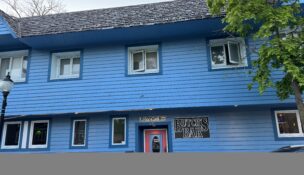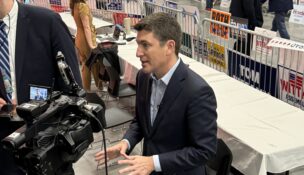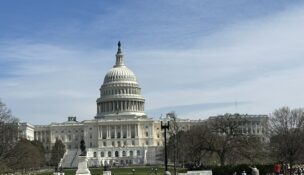SPD expects budget shortfall
By: Jack Zemlicka, [email protected]//September 7, 2010//
As someone who depends on appointments from the State Public Defender’s Office to sustain her practice, Dianne M. Erickson is not looking forward to February.
That is when a projected $9.5 million budgetary gap could begin and delay payments to private bar attorneys for almost five months, until the next state budget cycle begins on July 1.
While this is not the first time the agency has forecast and endured a shortfall, it is potentially the largest of the last three budget cycles. That possibility, combined with the stagnant $40-per-hour compensation rate for appointments, has private bar attorneys frustrated.
“It’s a really dangerous practice to be putting attorneys in such financial distress, while at the same time say you have to be dedicated to this litigation,” said Erickson, of Wasielewski & Erickson. “I’d go so far as to say this is rendering the private bar ineffective.”
Erickson and her husband have taken SPD appointments for years, but she and others suggested that the budget pattern and the low level of compensation is jeopardizing the ability of the private bar to effectively represent clients.
Only last year, almost 90 percent of Stevens Point attorney Jerod A. Barkley’s caseload came from public defender appointments.
But Barkley has since trimmed the percentage to account for a little more than half of his workload, largely because of the uncertainty involved in the process.
“As a long-term business plan, I’d like that percentage to be zero,” he said. “I’d rather have a client that pays me.”
In an effort to bridge the gap, the SPD transferred more than $880,000 in staff salary and fringe benefit balances remaining in the current budget toward the private bar appropriation, as it has done in previous years.
But the shift only will delay the shortfall by a few weeks.
Deborah M. Smith, head of the SPD Assigned Counsel Division, conceded that the ongoing payment delays put a strain on the agency’s relationship with the private bar and will deter some from taking cases in the future.
Currently, there are about 1,182 lawyers certified to take public defender appointments and during the first six months of 2010, the SPD appointed 25,611 cases to the private bar.
But less than half of the lawyers on the roster handled 85 percent of the appointments and 154 lawyers took no cases at all.
Smith said another shortfall will make it more difficult to appoint cases if people are not going to get paid for months at a time.
Not only that, but she said it is also “hard to keep experienced lawyers who have developed a good practice, with paying clients, active when they are not getting paid.”
Smith said her office processes about 5,000 private bar invoices per month and will continue to do so once the shortfall kicks in.
“In the past, when we’ve announced a shortfall, there is kind of a run on the bank,” she said. “I would expect that again this time.”
The agency is processing bills about 30 days from receipt and processed bills are sent to the Department of Administration which generates and mails checks within a day or two.
But Barkley said he has already begun to notice a delay in his payments, even though the shortfall is not expected to take effect until mid-February.
“Over the last couple of months, I’ve seen a significant increase in the delay from when I close something to when I get paid,” he said. “It used to be less than a month and now it’s a good month or two.”
As in past years, Smith said the SPD will request a budgetary increase to fix the shortfall as well as statutory changes to increase the private bar reimbursement rate, which has remained at $40 since 1995.
But Erickson suggested that attorneys who take appointments take a “harder line” with the state to negotiate improvements for the private bar.
“You can’t get paid until the end of a case and if it takes a year to close a felony, we’re just operating on free and borrowed labor,” she said. “Why wouldn’t the state see this as a good deal, exploiting attorneys?”
Madison attorney Erik R. Guenther said he personally avoids taking appointments out of principle.
While he takes advantage of various pro bono opportunities, the Hurley, Burish & Stanton attorney said that generally, it is hard to ask attorneys to take appointments at a low hourly rate and then impose an “un-bargained” delay in payment.
“That adds insult to injury,” Guenther said. “For me personally, I boycott SPD appointments because I feel it’s inappropriate to not adequately fund one aspect of the criminal justice system.”
But Barkley doesn’t expect boycotts will solve the problem.
Any improvements will likely come through the Legislature, although he is not optimistic that this is the budget cycle to find a solution, given the poor economy.
In the meantime, Barkley said he will continue to close cases, file invoices and wait for his checks in the mail.
“I’m concerned, but I endure it because I’ll get paid; it’s just a question of when,” he said. “Eventually, the goal is to avoid this nonsense altogether.”
Jack Zemlicka can be reached at [email protected].
Legal News
- Wisconsin man gets 15 years in prison for Door County bar fire that killed two
- Noncitizen voting, already illegal in federal elections, becomes a centerpiece of 2024 GOP messaging
- Wisconsin election officials fear voter confusion over 2 elections for same congressional seat
- ICC prosecutor seeks arrest warrant for Israeli and Hamas leaders, including Netanyahu
- Up in smoke: Workers remove dozens of apparent marijuana plants from Wisconsin Capitol tulip garden
- The Senate filibuster is a hurdle to any national abortion bill
- Bones found in 1989 in a Wisconsin chimney identified as man who last contacted relatives in 1970
- WisGOP convention spotlights abortion, higher education, immigration and national security
- NAACP: No consequences for UWM Pro-Palestinian protesters shows ‘bias’ and ‘privilege’
- New complaints filed against Northwestern over Kenosha football hazing scandal
- Justice Department submits proposed regulation to reschedule marijuana
- Reckless driving on Brown Deer Road results in fatal collision
WLJ People
- Power 30 Personal Injury Attorneys – Russell Nicolet
- Power 30 Personal Injury Attorneys – Benjamin Nicolet
- Power 30 Personal Injury Attorneys – Dustin T. Woehl
- Power 30 Personal Injury Attorneys – Katherine Metzger
- Power 30 Personal Injury Attorneys – Joseph Ryan
- Power 30 Personal Injury Attorneys – James M. Ryan
- Power 30 Personal Injury Attorneys – Dana Wachs
- Power 30 Personal Injury Attorneys – Mark L. Thomsen
- Power 30 Personal Injury Attorneys – Matthew Lein
- Power 30 Personal Injury Attorneys – Jeffrey A. Pitman
- Power 30 Personal Injury Attorneys – William Pemberton
- Power 30 Personal Injury Attorneys – Howard S. Sicula












